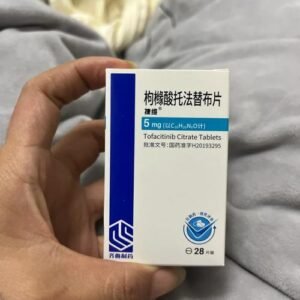medroxyprogesterone acetate tablets,
Effects and efficacy:
Irregular menstruation, functional uterine bleeding and endometriosis. Hormone-dependent tumors: breast cancer, endometrial cancer, prostate cancer, kidney cancer, etc.
Usage and dosage:
Adjust the menstrual cycle: Oral, starting from the second half of the menstrual cycle (the 16th-25th day of withdrawal bleeding), 10mg/time, once a day, for 10-14 days, and 3-6 cycles as appropriate. Secondary amenorrhea: Oral, oral, 5mg or 10mg a day, for 5-10 days, can be started at any time. Functional amenorrhea: Oral, 4-8mg/time, once a day, for 5-10 days. Abnormal uterine bleeding: Oral, starting from the 16th or 21st day of the menstrual cycle, 5mg or 10mg a day, for 5-10 days. Dysfunctional uterine bleeding (dysfunctional uterine bleeding): oral, 10-20 mg/day, once every 4-8 hours, for 2-3 consecutive days; the dose should be less than 10 mg after gradually reducing every 3 days, and the drug should be stopped 21 days after the hemostasis. Endometriosis: oral, 10 mg/time, 3 times a day, for 6 consecutive months. Breast cancer: oral, 500-1500 mg/day is recommended, even up to 2g per day (large doses can be divided into 2-3 times a day). Hormone-dependent tumors such as endometrial cancer, prostate cancer and renal cancer: oral, 100 mg/time, 3 times a day; or 500 mg/time, 1-2 times a day, as a maintenance dose after intramuscular injection. Note: If this product is used for a long time, attention should be paid to monitoring liver function and breast examination. Taking this product may cause stomach discomfort, especially when used for anti-tumor treatment, so it can be taken with meals. If you become pregnant while taking this medicine, you should inform your doctor immediately; if you need surgery (including dental surgery) while taking this medicine, please also inform your doctor that you are currently taking this medicine.
Adverse reactions:
When used for a long time and in large doses (such as for anti-tumor), Cushing’s syndrome, abnormal liver function and increased risk of ischemic heart disease may occur. Common adverse reactions: gastrointestinal reactions (vomiting, constipation, nausea); edema, fluid retention; increased appetite, weight fluctuations; insomnia; headache, dizziness, tremor; sweating; erectile dysfunction, etc. Rare adverse reactions: angioedema; Cushing’s syndrome; worsening of diabetes; depression, euphoria (excitement and joy without reason), changes in sexual desire; congestive heart failure; thrombophlebitis; pulmonary embolism; acne, hirsutism; diarrhea, dry mouth; muscle spasms; dysfunctional uterine bleeding; sudden changes in vision, diplopia, varying degrees of blindness, etc.
Drug contraindications:
Allergic to this product is prohibited during pregnancy. It is prohibited for liver and kidney dysfunction. It should be used with caution during lactation.
Share:
Products
Our offers
Health Classification
Let us work together to protect precious health




























